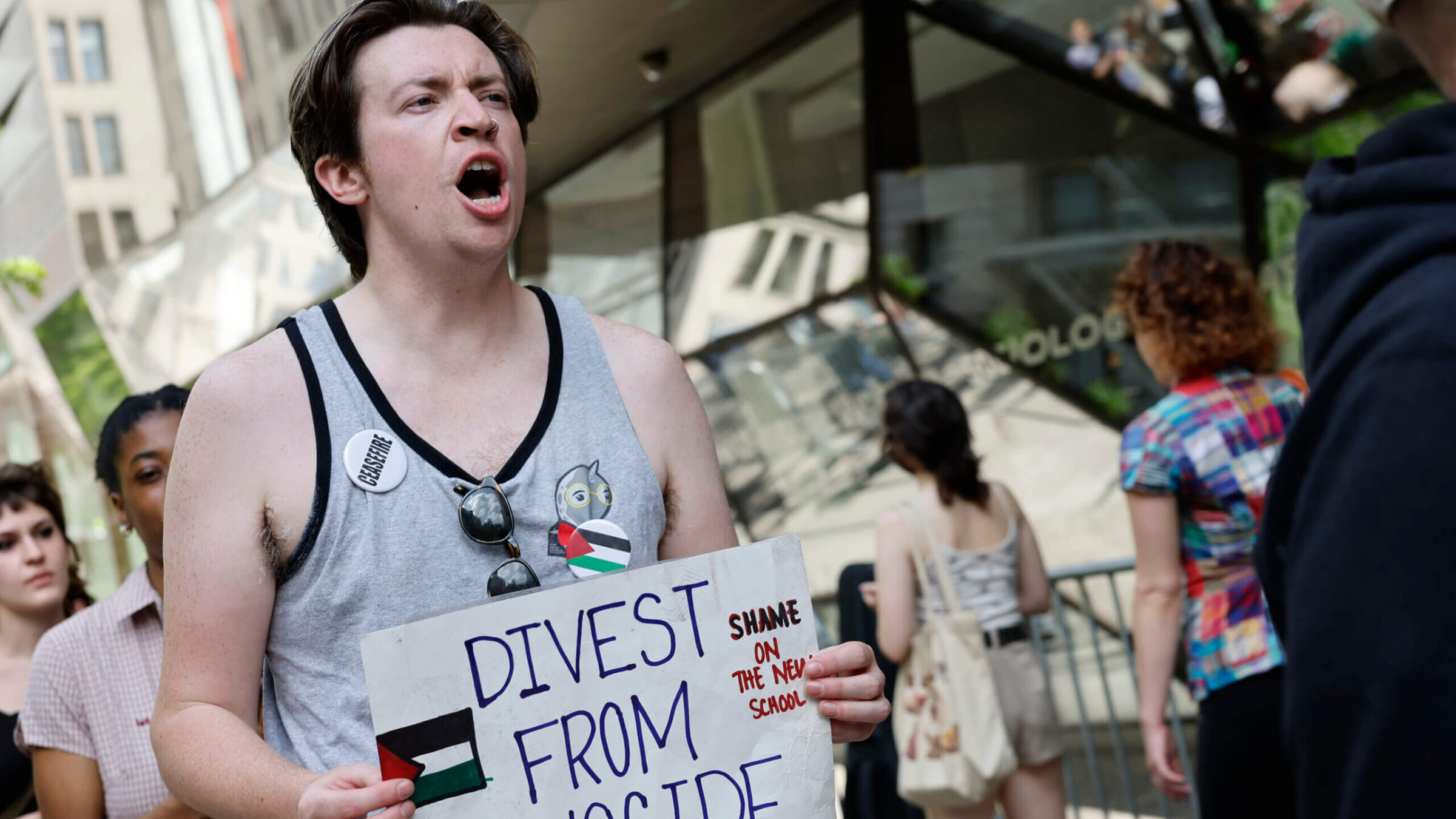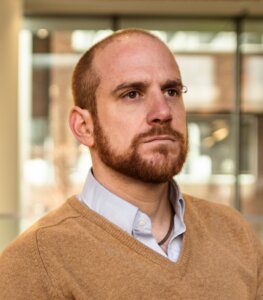The campus protests are no longer about Israel. They’re about America.
American college students are channeling genuine domestic political frustration into blaming Israel

People walk a picket line in support of The New School faculty as they set up a pro-Palestinian encampment on the university’s campus May 8 in New York City. Photo by Michael M. Santiago/Getty Images
Around noon, dozens of young students swarmed the iconic Harvard Yard lawn in front of the statue of John Harvard at Harvard University on April 24, armed with backpacks, sleeping bags, and tents. Within minutes, a central tent, a kitchen, and several other tents were erected. Signs quickly proliferated: “The People’s University of Palestine,” “Mercy for the Martyrs,” “Pride for Gaza,” “From Sea to Sea, Palestine will be Arab,” and “Boycott Israel.” Within the hour, masses of students chanted, “There is only one solution, Intifada, revolution.” Harvard’s encampment was one of many others that had sprung up at universities around the world, inspired by the initial Gaza Solidarity Encampment at Columbia University.
This is my final week as a graduate student at the Harvard Kennedy School. As an Israeli student, this was not the year I anticipated. Since the outbreak of the war in Gaza, we have witnessed not only legitimate criticism of Prime Minister Benjamin Netanyahu’s government’s policies regarding the war, but also a systematic attempt to delegitimize the Israeli identity and the right of the state of Israel to exist.
One of my professors asked me whether I thought the protesters at Harvard Yard are Israel haters versus people who are just horrified by the bombing in Gaza. I believe neither reason is correct. The protests are no longer about Israel but about America.
Israel has become the perfect scapegoat for postcolonial and anti-imperialist theories that have spread in recent decades in elite universities. If we can just remove the “Israeli problem,” the ideology contends, we will achieve a decisive victory against the entire oppressive system.
It might seem like the recent encampment protests are a response to the horrific war in Gaza. But in reality, they mark a departure from what is happening on the ground in the Middle East. While the war is still ongoing, it’s definitely past its peak, and Hamas continues to refuse deal after deal that could release the hostages and end it. Since World War II, every generation has had its protest. Boomers had Vietnam, millennials had Occupy Wall Street, and now, Gen Z has Palestine.
The intensification of protests, accompanied by explicit antisemitic statements, is the result of profound social and political pessimism among young Americans. Three-quarters of American youth under 30 think the country is heading in the wrong direction, more than any other age group, according to a poll conducted by the The Wall Street Journal in February. One-third of young voters have a negative opinion of both Donald Trump and President Joe Biden, more than any other age group, and 63% feel that no party represents them. The percentage of 12th graders saying it’s hard to find hope in the world is at its highest since 1976, when measurements began at the University of Michigan.
In addition, many college students realize that many of their political goals are collapsing. They find themselves facing the 2024 presidential election with two elderly candidates who represent the past, not the future. In recent years, the progressive ideas that have taken a stronghold in universities have come under widespread backlash, and the politicians representing them have suffered defeat after defeat.
The American youth is full of political energy with nowhere to channel it. American society is more polarized than ever, and young Americans seek solutions. When societies reach a crisis, they have two options — to think about what they can do or who they can blame. It seems that many college students have chosen the latter.
Walking through the protest encampments, it’s clear who the ultimate culprit is – Israel. Why don’t we have universal healthcare? Military funding for Israel. Police brutality toward people of color? Blame Israeli police trainings. Progressive candidates losing in the midterms? Blame the Israel lobby. Many young Americans are channeling their despair about America toward Israel, turning Zionism into a pejorative term. At Columbia University, we saw protesters calling for Jews to return to Poland, open support for Hamas, and students banning Zionists from entering the tent area. What the Israeli government does or doesn’t do now no longer really matters. They have become fixed as the villain responsible for America’s problems.
It is precisely because of this desire to blame Israel that Americans should be worried. The rise in antisemitism and the widespread adoption of anti-Zionist views are not a problem but a symptom of societal collapse. Throughout history, every society that allowed antisemitism to fester, like Nazi Germany or the Soviet Union, has eventually collapsed. Only failed states, like Venezuela or Yemen, adopt anti-Zionism as their central ideology. States that explicitly reject antisemitic views like Bahrain, Saudi Arabia and Morocco, who choose to support religious pluralism, are also states that manage to progress. Why? Because they don’t look for someone to blame for their problems, but rather, they look for what to do about them.
The pro-Palestinian protests are driven by young people with a deep sense of justice and a desire for change, but are fueled by a deep political pessimism. The widespread adoption among young people of anti-Zionist views, especially in one of the friendliest countries in the world to Israel and Jews, should worry all Americans. These protests are not only a threat to the U.S.’s strategic relationship with Israel, but they are also challenging the resilience of American society to navigate and overcome its tremendous challenges.
Up until the campus encampments, critics of Israel’s war in Gaza were very efficient in their protest, as seen in the successful uncommitted campaign that sent Biden and Democrats a strong message that he couldn’t ignore. And while the campus protests may have drawn massive global awareness to Gaza and the plight of the Palestinians, the endless accounts of antisemitism and anti-American sentiment (such as defacing the George Washington statue at George Washington University) have put the protesters at odds with the average American.
The only way for the campus protests and for young Americans to change course is to not only reject antisemitism, but also reject the delegitimization of Israeli identity. If the protesters were more consistent and equal-handed with their demand for justice and, for example, called for the release of the hostages, dismantling Hamas and a two-state solution, not only would they gain more support from the public, but many Israelis living in the U.S. would likely join them.
A message from our Publisher & CEO Rachel Fishman Feddersen

I hope you appreciated this article. Before you go, I’d like to ask you to please support the Forward’s award-winning, nonprofit journalism so that we can be prepared for whatever news 2025 brings.
At a time when other newsrooms are closing or cutting back, the Forward has removed its paywall and invested additional resources to report on the ground from Israel and around the U.S. on the impact of the war, rising antisemitism and polarized discourse.
Readers like you make it all possible. Support our work by becoming a Forward Member and connect with our journalism and your community.
— Rachel Fishman Feddersen, Publisher and CEO




























